Author Archives: Bonnie Beth Chernin
May 22, 2013 by Bonnie Beth Chernin
The Artist’s Torah
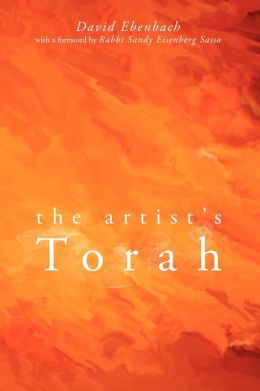 I’m always on the look-out for commentary I can read while the Torah’s chanted in Hebrew I don’t understand during Saturday morning Shabbat services. So when I came across The Artist’s Torah by David Ebenbach, also the author of two short story collections and a book of poetry, I was grateful to have new material to delve into.
I’m always on the look-out for commentary I can read while the Torah’s chanted in Hebrew I don’t understand during Saturday morning Shabbat services. So when I came across The Artist’s Torah by David Ebenbach, also the author of two short story collections and a book of poetry, I was grateful to have new material to delve into.
But you don’t need to attend religious services to enjoy Ebenbach’s thoughtful book. And you don’t need to be an artist. Anyone interested in the creative process will find something meaningful in this rich commentary that explores the weekly Torah readings through the gaze of understanding the creative life.
In a recent interview with Ebenbach (who crossed paths with me 15 years ago when we both attended an MFA in writing program), he said, “The intention is not that you have to be traditionally religious to find yourself in these pages,” and added, “The book wrestles with what it means to be spiritually engaged and doesn’t make any assumptions about the form that takes.”
Ebenbach poses the big questions: What is creativity? Where does it come from? How does creativity get blocked and how can blocks be overcome? He sets out to find what the sacred text of Judaism has to say in response. In addition, he presents the challenge of whether he can find insights throughout the Torah and not just in Genesis with the explicit focus on creation.
- No Comments
March 5, 2013 by Bonnie Beth Chernin
Do Not Abandon Me: Judaism and Alzheimer’s Disease
 During the years my father struggled with dementia—from the early signs that began when he walked around touching sculptures in a sculpture garden, despite the clearly marked signs advising visitors not to touch; to the later years when he remembered I have a daughter but not her name; to the end stage with his gait reduced to short, slow steps, his gaze at times turned neither inward nor outward— I wish I had available to me the new book from URJ Press, Broken Fragments: Jewish Experiences of Alzheimer’s Disease through Diagnosis, Adaptation, and Moving On.
During the years my father struggled with dementia—from the early signs that began when he walked around touching sculptures in a sculpture garden, despite the clearly marked signs advising visitors not to touch; to the later years when he remembered I have a daughter but not her name; to the end stage with his gait reduced to short, slow steps, his gaze at times turned neither inward nor outward— I wish I had available to me the new book from URJ Press, Broken Fragments: Jewish Experiences of Alzheimer’s Disease through Diagnosis, Adaptation, and Moving On.
Broken Fragments, edited by Douglas J. Kohn, rabbi of Congregation Emanu El in Redlands, California, is filled with insights from rabbis, cantors, doctors, social workers, and family members of people with Alzheimer’s disease. These multiple viewpoints extend across the different stages of Alzheimer’s and dementia and reflect the array of issues caregivers and family members face. Reading this collection of essays is the literary equivalent of someone intimately whispering into your ear, “You are not alone.”
Hope and pain intertwine in these pages that do not sugarcoat the struggle of family members to treat a loved one with dignity in the face of their own frustration and loss of the person they knew. This struggle is especially poignant in the essays “Shining Through: Being a Daughter When Mom Is Changing,” “Care at Home or Care in a Home?” and “He’s Still My Father.” To read an adapted chapter from the book, see the excerpt by Rabbi Cary Kozberg in the current issue of Reform Judaism Magazine.
- 1 Comment
December 22, 2011 by Bonnie Beth Chernin
Menorahs I Have Known
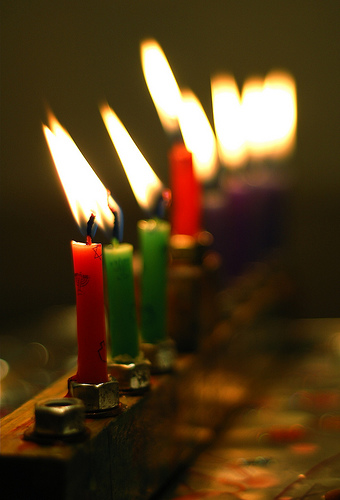
http://www.flickr.com/bontempscharly
I had only one menorah in my life for my first 18 years. The blue chanukiah with brass candle holders in the shape of simple lamps that belonged to my parents. I don’t know how they came to own this menorah, but I welcomed its reliable appearance that marked our holiday tradition as much as my father’s latkes and my grandmother’s five dollar checks to all of us grandchildren.
But more menorahs have come into my life as I’ve moved through the stages of being a single adult, followed by marriage and motherhood.
A graceful pewter menorah, with purple glass at the base where the candle holders branched out, reminded me of my mother when I began celebrating Chanukah in my own apartment. I fell in love with the menorah at a local Judaica store. My mother adored glass, the lure of light seen in its reflection. When I saw the flickering candles shining in the menorah’s smooth purple disk, it brought back the insight into wonder my mother had shared with me.
That menorah was set aside the first year of my marriage when my husband brought his own, made of stone and lit with oil. Since for years I had faithfully used the blue square box of multicolored candles to bring light into December darkness, I was intrigued to use a menorah that featured a different lighting technique.
- 1 Comment
September 21, 2011 by Bonnie Beth Chernin
Rosh Hashanah Dishes of Wishes
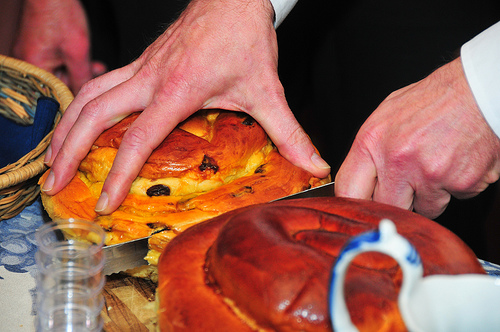 For the new year I’ll have a new congressman. He’s anti-choice and wants cuts that threaten our social welfare. That’s just the tip of the iceberg for Bob Turner, who won the special election for Anthony Weiner’s seat, which includes the New York City district where I live.
For the new year I’ll have a new congressman. He’s anti-choice and wants cuts that threaten our social welfare. That’s just the tip of the iceberg for Bob Turner, who won the special election for Anthony Weiner’s seat, which includes the New York City district where I live.
And that’s the kicker. One of the key reasons I put up with living in this exhilarating but exhausting city with its bad air, crowded subways, concrete backyards, constant sirens, and exorbitant expense is that this metropolis breeds acceptance of liberal ideas. That here I will find like-minded people who believe government exists to provide a safety net for our communities and public services that protect the most vulnerable among us. I trusted that I lived in a place where my elected representatives thought likewise. This is no longer true and residing in my part of Queens has now upped the ante for bearing life in this city.
As I turn to the new year of 5772, I draw sustenance from a Sephardic tradition that uses symbolic foods accompanied by prayers with wishes for the new year. Rabbi Jill Jacobs explains that many of the prayers incorporate Hebrew puns with the food mentioned. She encourages us to develop our own English puns as we prepare our Rosh Hashanah menu.
So for erev Rosh Hashanah when I am hosting guests for dinner, I decided to serve beet soup to “beet” the blues away that have followed this special election. I plan to get a raisin challah so I can start “raisin’” my energy for Obama’s 2012 election, and I will offer a small bowl of dates, to mark the date when redistricting starts in New York state and with it the loss of two congressional seats, one I hope in my neighborhood.
These are my dishes of wishes I look forward to serving.
May this year be filled with all you hope for in a world at peace. Shana Tova.
- No Comments
July 22, 2011 by Bonnie Beth Chernin
Judaica and the Good Find
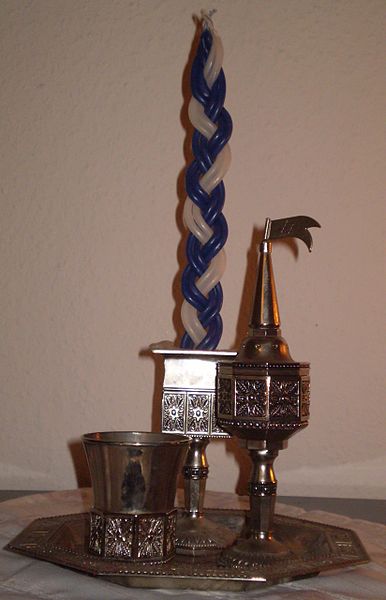 When I decided to stop at an outdoor flea market in Ocean County, New Jersey on the way to visit my parents in their retirement community, I recalled the pebbled blue havdalah spice box my mother had once rescued from entering an auction. The memory instinctively put me on alert for abandoned Judaica while I scoured folding tables full of old toy action figures, record albums, how-to-books, and discounted underwear still wrapped in plastic from a factory in Haiti.
When I decided to stop at an outdoor flea market in Ocean County, New Jersey on the way to visit my parents in their retirement community, I recalled the pebbled blue havdalah spice box my mother had once rescued from entering an auction. The memory instinctively put me on alert for abandoned Judaica while I scoured folding tables full of old toy action figures, record albums, how-to-books, and discounted underwear still wrapped in plastic from a factory in Haiti.
In the late 70s, the father-in-law of my mother’s friend died. Janice asked my mother to look at the remnants of his house before the items were tagged for an auction sale.
“It’s time for them to go,” Janice said. “We’ve sold his house, now we need to get rid of his stuff.”
My mother was a veteran of flea markets during the 70s. She bought ruby red Depression glassware if it was priced under five dollars. She was also known to walk away from any table whose owner didn’t bargain. My mother had an eye for value. She would turn over a cup and saucer to check its set mark, and she could tell real Depression glass from an imitation. So when my mother came home and told me she had reviewed the acquisitions of an older man of means, I fully expected to see one or two things she brought back as a “good find.”
What she showed me was a blue havdalah spice box with a brass flag on top and matching candlesticks for Shabbat. Yet we had never said havdalah in our house, and my mother didn’t need any more Shabbat candlesticks.
“I couldn’t let this get sold at an auction,” she said.
I thought at the ripe age of 17, I would now need to start saying havdalah, the Saturday night prayer that says good-bye to Shabbat and ushers in a new week. I was wrong. We continued to light Sabbath candles on Friday night, offering a warm hello to Shabbat, but we did not match it with a fond farewell, despite the addition of the spice box. My mother’s rescue stopped short of change.
Although we did not incorporate havdalah into our weekends, the spice box and candlesticks remained with my mother through three moves over thirty years and has become an intrinsic part of her dining room display, front and center on her wall unit shelf.
As I walked among the tables, my mind filled with the memory of my mother’s rescue. I scanned each table for a stray kiddush cup, lone menorah, or other Jewish items that might need saving from relentless sun and forgotten purpose.
Nothing turned up, but I realized my search had embraced my mother’s spirit of seeking treasure in another’s trash: look out for a “good find”—and our heritage.
- 3 Comments
April 7, 2011 by Bonnie Beth Chernin
Birthday Serenade
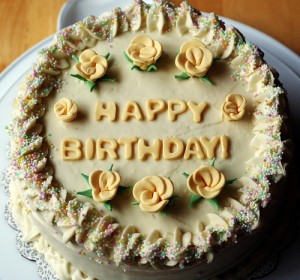 I had just finished listening to my daughter serenade me with Happy Birthday to You when I asked if she could sing the song again in Hebrew. Maybe it was because I didn’t want my birthday celebration to end, or maybe it was because I knew she could do it.
I had just finished listening to my daughter serenade me with Happy Birthday to You when I asked if she could sing the song again in Hebrew. Maybe it was because I didn’t want my birthday celebration to end, or maybe it was because I knew she could do it.
Rachel had learned the Hebrew version at her Jewish day school, a school under the auspices of the Conservative movement. I mention this only as a report released in 2008 about attitudes concerning Jewish days schools found that many people, at least in the New York City area, think a Jewish day school refers to an Orthodox yeshiva and are not aware that day schools can also encompass Conservative Judaism
At school Rachel learned Yom Huledet Same’ach, Happy Birthday, sung to the popular tune first composed by two sisters Mildred Hill and Patty Smith Hill in 1893. But Rachel’s 2011 Hebrew rendition took on a new twist, at least for me. (more…)
- 5 Comments
March 9, 2011 by Bonnie Beth Chernin
Israel’s Starry, Starry Night
 The first time I visited Israel in 1979, Sadat and Begin signed the peace treaty between Egypt and Israel. The announcement came over the radio while I sat on the ground near lush grapefruit trees and drank coffee poured from a thermos, on break from picking the yellow fruit. The Israelis who listened to the news with me responded with weary skepticism, “We’ll see what this means.”
The first time I visited Israel in 1979, Sadat and Begin signed the peace treaty between Egypt and Israel. The announcement came over the radio while I sat on the ground near lush grapefruit trees and drank coffee poured from a thermos, on break from picking the yellow fruit. The Israelis who listened to the news with me responded with weary skepticism, “We’ll see what this means.”
The first time my daughter visited Israel on our family trip this February, Egypt was again taking a momentous step as the people of Egypt forced out Mubarak and demanded greater freedom. The Israelis we met along the way again expressed skepticism, “We’ll see how this plays out.”
And while the calls of democracy that began in Tunisia and Egypt and spread to Libya suggested a seeming realignment of longheld stars, during our stay in Eilat, in the south of Israel, my husband, daughter and I, along with a group of other families, saw the Israeli night sky in its full array of comforting constellations, the stars in place in their trusted positions.
A friend had organized the trip through Dark Sky Safari with guide Eitan Schwartz who brought his telescope to a site outside the mountains of Eilat. He spread out blankets so we we could lie down and see the sky. He also brought a powerful, green laser pointer that traced a direct line to the stars in their patterns. (more…)
- 2 Comments
February 8, 2011 by Bonnie Beth Chernin
Shabbat Tales
T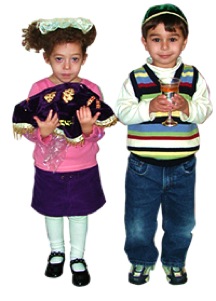 he first Shabbat my husband and I said the parents’ blessing for children our daughter was an infant, her delicate head with fine hair soft to my touch, and the final words of the prayer a quiet hope for the future, “May God turn God’s spirit to you and grant you peace.”
he first Shabbat my husband and I said the parents’ blessing for children our daughter was an infant, her delicate head with fine hair soft to my touch, and the final words of the prayer a quiet hope for the future, “May God turn God’s spirit to you and grant you peace.”
When the pre-school years came, we continued the parents’ blessing for children and taught Rachel to say, hamotzi, the prayer over our challah covered with blue velvet, an easy-to-learn Hebrew sentence.
Soon she moved on to helping me light the candles when I received a gift of a candle lighter, a long silver wand with a candle stub at the end whose lit wick, in turn, lights the two Shabbat candles in our brass holders.
As elementary school started and our schedules became more complicated, we didn’t sit down every day for dinner as a family. Except on Shabbat. On Friday nights our only plans are to be with each other.
“What’s the parashah for the week?” my husband now asks Rachel, after the meal and before dessert.
He knows the parashah from his own day school days, Rachel is learning it now in fourth grade, and I try to keep up reading weekly Torah translations online, as I never learned the texts back in my Hebrew school years.
But recently I found wedged in my bookshelf, While Standing on One Foot: Puzzle Stories and Wisdom Tales from the Jewish Tradition by Nina Jaffe and Steve Zeitlin first published in 1993. Why not add this to Shabbat, I figured. Besides, some of the tales are short, two pages, not too long to postpone dessert. (more…)
- 1 Comment
January 5, 2011 by Bonnie Beth Chernin
Three Faiths and a Pizza
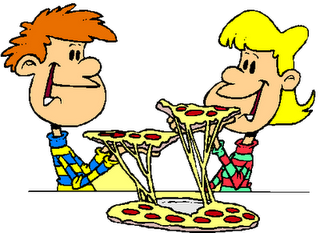 The day was supposed to be a date with my husband, without my daughter, that included lunch and a visit to the New York Public Library to see Three Faiths: Judaism, Christianity, Islam, an exhibit of texts from each religion.
The day was supposed to be a date with my husband, without my daughter, that included lunch and a visit to the New York Public Library to see Three Faiths: Judaism, Christianity, Islam, an exhibit of texts from each religion.
We decided to stop at a restaurant where we could order white pizza and, after a discussion of whether we should get a small or medium, decided on the medium size. The waiter brought a huge pie to our table. Clearly, we should have chosen the small.
“It’s okay,” I assured my husband. “We’ll take the leftovers with us and eat it for dinner tomorrow.”
At the end of the meal, the waiter kindly provided a plate and bag, instead of a cumbersome box, and off we went toward Forty-Second and Fifth for the library.
The security guard gave my purse a cursory look and accepted my comment that we had pizza in the bag but wouldn’t eat in the building. We walked over to the Gottesman Exhibition Hall where another guard stopped us to look in our bag.
“You can’t bring food into the exhibit,” she said. (more…)
- 3 Comments
November 5, 2010 by Bonnie Beth Chernin
A Bright Spot in the Mid-Term Elections
 After the shift in Congressional power, I’m grateful for any bright spot in the 2010 mid-term elections. For me, that bright spot was the passage of the Kansas Disqualification Amendment, which no longer allows the Kansas legislature to take away a person’s right to vote because she or he lives with mental illness.
After the shift in Congressional power, I’m grateful for any bright spot in the 2010 mid-term elections. For me, that bright spot was the passage of the Kansas Disqualification Amendment, which no longer allows the Kansas legislature to take away a person’s right to vote because she or he lives with mental illness.
Not that the Kansas legislature had ever used its power to stop someone with mental illness from voting, but the law was on the books, and with it the stifling weight of stigma and discrimination. With the passage of the statewide ballot, also known as Constitutional Amendment 2, people living with mental illness in Kansas have one less burden to bear.
It’s not on the same scale as Ken Steele’s Mental Health Voter Empowerment Project started in 1994 that registered people with serious mental illness to vote (read more in Steele’s powerful memoir The Day the Voices Stopped) yet it rights a wrong that should have been corrected years ago.
I learned of the Disqualification Amendment around the same time I read Elliot Kukla’s article, “The Spirituality of Madness,” in a recent issue of Zeek. Kukla turned to biblical stories to learn what Judaism teaches about mental illness. His reference to Naomi’s depression in the Book of Ruth led me to read the story again. (more…)
- 1 Comment
 Please wait...
Please wait...